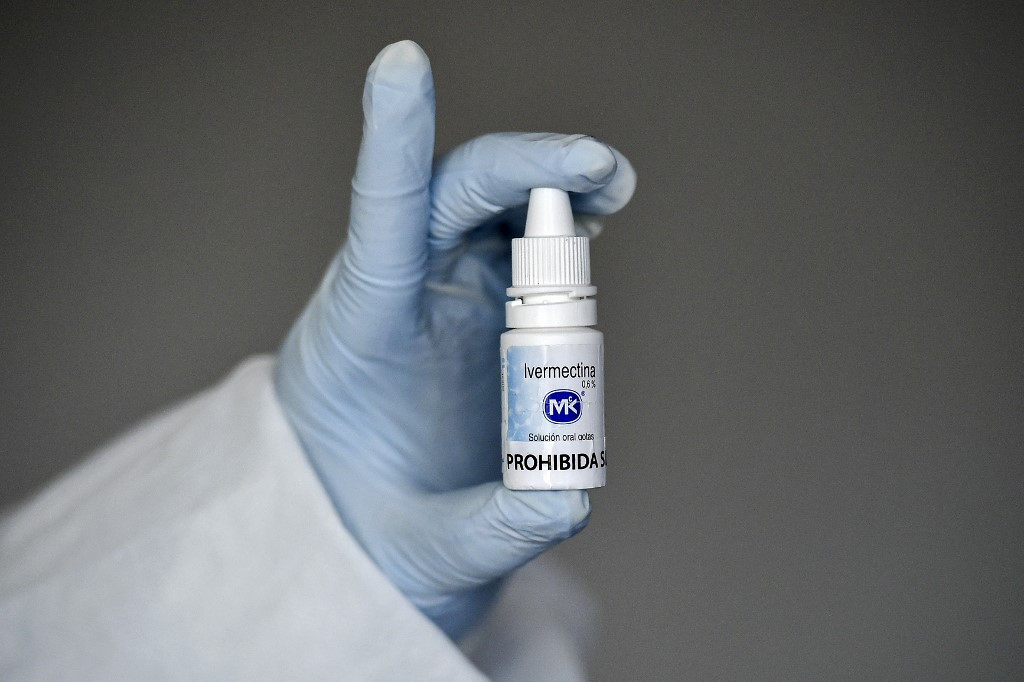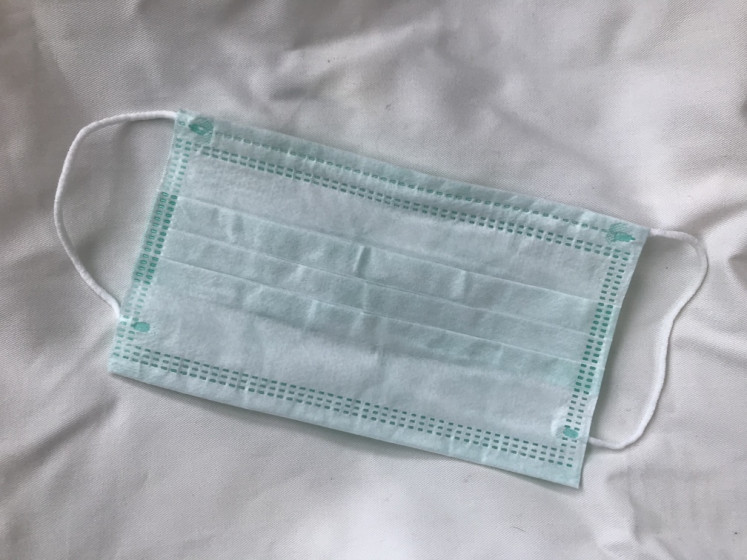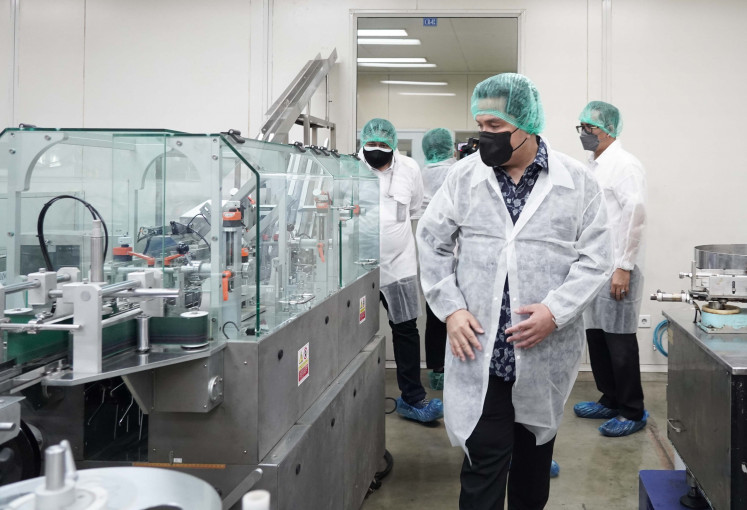Popular Reads
Top Results
Can't find what you're looking for?
View all search resultsPopular Reads
Top Results
Can't find what you're looking for?
View all search resultsDon't DIY: 'Alternative remedies' pose new dangers in COVID-19 infodemic
With Indonesia recording unprecedented COVID-19 cases and deaths, many are turning to well-meaning but unproven and potentially dangerous tips and remedies being shared on social media among a jaded and weary public.
Change text size
Gift Premium Articles
to Anyone
 Unproven worm medicine: A health worker holds up a bottle of ivermectin on July 21, 2020 in Cali, Colombia. While the antiparasitic is being studied around the globe as a potential treatment for COVID-19, as of March 2021, the World Health Organization has recommended its use only in clinical trials. (AFP/Luis ROBAYO )
Unproven worm medicine: A health worker holds up a bottle of ivermectin on July 21, 2020 in Cali, Colombia. While the antiparasitic is being studied around the globe as a potential treatment for COVID-19, as of March 2021, the World Health Organization has recommended its use only in clinical trials. (AFP/Luis ROBAYO )
A
mid the ongoing “second wave” of COVID-19, some people have started taking it upon themselves to fend off the ever-looming threat of the coronavirus with unproven do-it-yourself (DIY) remedies and self-medication tips spreading rampantly on social media platforms, such as WhatsApp and Facebook.
As with most things in this age of information, the origins of these methods are largely untraceable. Worse still, the majority of these methods are not based in science. Just how potentially dangerous could these unproven methods be?
Muhamad Rachman Fadhilah, a 26-year-old medical intern, said that the medical community was fully aware of and concerned about these DIY anti-coronavirus methods. One strange tip he recalled was one that advised wearing masks inside out, which claimed that the inner layer could filter air better. Some of the more dangerous ones he recalled included suggestions to drink cajuput oil and to take certain antibiotics or antivirals.
These unfounded “tips”, no matter how well meaning, could potentially cause physical harm. Cajuput oil, which is generally applied to the skin, can cause respiratory problems when inhaled, according to WebMD. Meanwhile, consuming antibiotics and antivirals without a prescription from a licensed doctor could lead to improper dosing, side effects, contraindications with any current medication and other improper uses that could harm a person’s health.
Oddly enough, these unproven methods from unknown sources had even made their way to his extended family’s WhatsApp group, heedless of Rachman’s medical training.
Sudden rise of ivermectin
One of the currently sought-after medications is ivermectin, a medicine that treats parasitic infections like roundworm and scabies, but which is now being touted as effective in preventing and treating COVID-19.
While research is ongoing on the antiparastic as a potential treatment for COVID-19, the World Health Organization has recommended its use only in clinical trials.
Read also: Prices jump for unproven COVID-19 drug Ivermectin
According to 27-year-old doctor Fauzan Trisuryoaji, who also volunteers at the Human Resources Development Agency (BPSDM), this claim is not backed by either scientific evidence or research. Fauzan added that the current promotion of ivermectin as COVID-19 therapy was similar to rumors circulating in the early stages of the pandemic that recommended chloroquine, a medicine for treating malaria, could be used to treat COVID-19.
What’s also dangerous is that these self-medication tips trending on social media prompt people to go buy certain drugs in large amounts, which create shortages for hospitals and medical professionals so they aren’t available for the patients who actually need them.
“There are hospitals that haven't received any supplies of antibiotics and antivirals for the past three days,” Fauzan said on July 1, 2021.
Many hospitals are also facing a shortage of oxygen.
Read also: ‘Like a war zone’: Doctors, hospitals plead for help amid COVID-19 upsurge
Another of Fauzan’s concerns is self-touted COVID-19 “medicines” from nonmedical professionals, such as a product that Muslim cleric Andi Hidayat is giving away for free for people who test positive for the virus. The problem is, he has not disclosed the drug’s composition.
Popularity is also growing for alternative “treatments”, most of which are home remedies made from natural ingredients, such as coconut water, lemon juice, ginger water and garlic.
Nanda Satia Nugraha, a 28-year-old IT product analyst and musician, said these were the types of natural remedies often recommended on his extended family’s WhatsApp group, comprised mostly of older family members. Another forwarded message was about the importance of wudu, Islamic ablution, to cleanse one’s body of viruses and bacteria.
Nanda recognized that while these tips may have potential health benefits, what irked him was how they seemed to be held in higher regard than professional medical advice. Rachman and Fauzan also expressed the same concern, emphasizing that the belief in alternative methods as better than medical advice was often more dangerous than the methods themselves.
When his mother contracted COVID-19, freelancer Nada Ardhi Pradya, 29, recounted that his relatives often gave unsolicited nonmedical advice along with their well wishes. It turned out that several relatives who shared these “tips” didn’t even follow them, Nada said, including an aunt who shared the now well-known concoction of coconut water with lemon juice, salt and honey, which she hadn't even tried herself.
Misinformation epidemic
According to psychologist Mutia Aprilia Permata Kusumah, people tended to believe information that aligned with their personal beliefs and further, that people subconsciously sought information that reaffirmed their own beliefs.
Unfortunately, because of poor digital literacy, Indonesians often don’t verify the easily digestible information they find before consuming it. Paired with the tendency of Indonesians to share anything they think might be useful, this often leads to widespread misinformation.
That most unverified information is spread by older people, said Mutia, was due to the fact that they did not grow up in a digital world, so checking facts and sources when using the internet did not come naturally to them. They also generally trusted the people who provided the information, since most older users communicate primarily with close friends and relatives on digital platforms.
Spiking shortage: State-owned Enterprises Minister Erick Thohir visits the facilities of PT Indofarma in West Cikarang, Bekasi, West Java, on June 21, 2021. The state-owned pharmaceutical company started producing ivermectin to meet a sudden surge in demand for the drug, which is for treating parasitic infections, after its unproven efficacy as a COVID-19 treatment started trending on social media. (SOEs Ministry/Dhika Permana)This far-reaching trend in self-medication tips could also be attributed to a general sense of panic and desperation among the public during this seemingly unending pandemic, Fauzan said.
Psychologist Mutia said that since older people were more at risk of getting and developing severe COVID-19, they were more eager to spread any new tidbits they felt might help fend off or treat the disease. Added to the fact that COVID-19 tests and treatments were not cheap, alternative methods could be seen as a viable solution for those who did not have the luxury of working from home.
‘Pandemic denial’
While working in the COVID-19 emergency and isolation wards at Cikalong Wetan Regional General Hospital four months ago, Rachman noticed that many people still didn’t believe that the pandemic was real, even though it had been going on for more than a year. Fauzan also noticed that people were growing more dismissive of the health protocols, going so far as to say that public compliance was much lower today than it was at the start of the pandemic in March 2020.
Meanwhile, Rachman and Fauzan had both observed people who resisted testing and treatment, even to the point they swore furiously at the health workers who were trying to help them.
Nanda believed that a deeply ingrained distrust of health services contributed to the widespread popularity of self-medication and home remedies across the archipelago. Lack of trust in the government and the inconsistency of government policies also played a part in pushing people toward conspiracy theories. Left with no one to trust, he said, some people were opting for information that came from alternative, non-authoritative sources.
Other factors that may have contributed to the situation, Nanda said, included feelings of unfairness, marginalization and discrimination, feeling more knowledgeable than others and just plain denial.
Practical health measures
The best way to prevent the spread of COVID-19 remained the same, Rachman said: “If there is no urgent need, it’s better to stay at home and avoid large crowds. If you really must go outside, wear your mask properly and don’t forget to wash your hands.”
To support the body’s immune system, Rachman recommended eating nutritious and balanced meals, exercise regularly, get enough rest and take vitamins and supplements if necessary. Maintaining vigilance was also crucial, as people who had recovered from COVID-19 could get it again.
Separately, Fauzan stressed the importance of getting vaccinated. As a medical professional making daily rounds, he had experienced firsthand how being vaccinated had helped boost his immunity against the disease.
As for the rampant spread of unverified information and unproven methods, Rachman said collective effort was needed in meticulously checking information before consuming or forwarding it.
“The key is to be more responsible in what you share on the internet. If you share health-related information, you should have a credible source to back it up. It can’t be based on hearsay,” he stressed.












